The Pipetting Robots Market is estimated to be valued at USD 2.7 billion in 2025 and is projected to reach USD 6.3 billion by 2035, registering a compound annual growth rate (CAGR) of 8.8% over the forecast period.
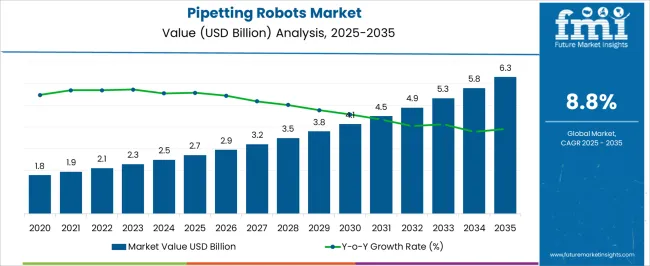
| Metric | Value |
|---|---|
| Pipetting Robots Market Estimated Value in (2025 E) | USD 2.7 billion |
| Pipetting Robots Market Forecast Value in (2035 F) | USD 6.3 billion |
| Forecast CAGR (2025 to 2035) | 8.8% |
The Pipetting Robots market is experiencing significant growth as laboratory automation becomes an essential component of modern research and clinical workflows. The market is being driven by the need for high-precision liquid handling, increased throughput, and reduced human error in repetitive tasks.
Automation in pipetting has become crucial in healthcare, pharmaceutical research, genomics, and biotechnology applications, where accuracy and consistency directly impact experimental outcomes and regulatory compliance. Investments in laboratory infrastructure, the growing demand for high-throughput screening, and the adoption of robotics to improve operational efficiency are shaping the market landscape.
As laboratories continue to handle larger volumes of samples and complex assays, automated pipetting systems offer scalable, adaptable solutions that reduce operational costs and improve reproducibility Future growth is expected to be fueled by the integration of intelligent software, AI-enabled protocol optimization, and modular designs that allow seamless upgrades without hardware replacement, providing laboratories with flexible and long-term automation solutions.
The pipetting robots market is segmented by product type, end use, and geographic regions. By product type, pipetting robots market is divided into Automatic Pipetting Robots and Semiautomatic Pipetting Robots. In terms of end use, pipetting robots market is classified into Healthcare, Chemicals, Pharmaceutical, Biotechnology, and Others. Regionally, the pipetting robots industry is classified into North America, Latin America, Western Europe, Eastern Europe, Balkan & Baltic Countries, Russia & Belarus, Central Asia, East Asia, South Asia & Pacific, and the Middle East & Africa.
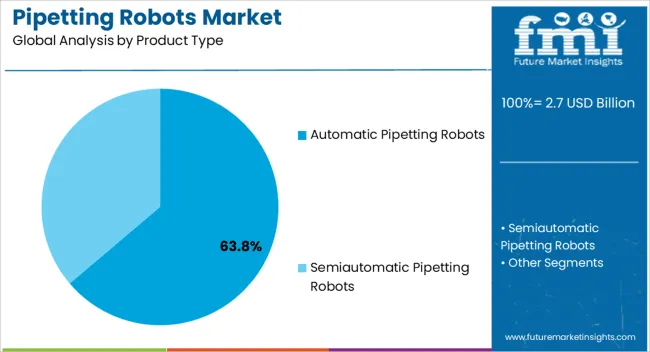
The Automatic Pipetting Robots product type is projected to hold 63.80% of the overall Pipetting Robots market revenue share in 2025, establishing it as the leading segment. This dominance is being driven by the high demand for precision, speed, and reproducibility in laboratory processes, where manual pipetting is prone to errors and inconsistencies. Automatic systems allow researchers to perform complex protocols with minimal intervention, improving throughput and accuracy, which is critical in high-volume laboratories and large-scale clinical studies.
The flexibility to program and customize liquid handling tasks has reinforced adoption, as laboratories can adjust protocols without replacing hardware. Additionally, the reduction of repetitive strain injuries and operational fatigue among laboratory staff has contributed to the widespread deployment of automatic systems.
The segment has benefited from growing awareness of automation benefits, the need for compliance with regulatory standards, and the increased use of robotics in both research and diagnostic workflows Continued innovations in modular design and AI-based optimization are expected to further strengthen the segment’s market leadership in the coming years.
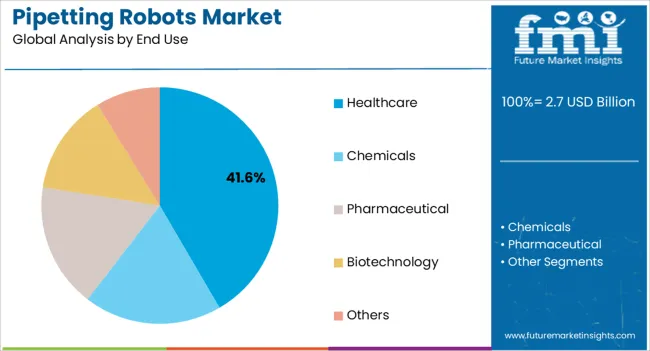
The Healthcare end-use industry segment is expected to account for 41.60% of the Pipetting Robots market revenue share in 2025, making it the largest consumer segment. This leading position has been attributed to the increasing adoption of automated liquid handling systems in clinical laboratories, diagnostic centers, and pharmaceutical research facilities. The rising need for high-throughput screening, precision diagnostics, and consistent sample handling has driven demand in this sector.
Automation ensures that human error is minimized in critical testing procedures, while simultaneously increasing throughput to handle growing patient volumes. Regulatory compliance and stringent quality control requirements in healthcare laboratories have further accelerated the adoption of pipetting robots.
Additionally, the integration of these systems with laboratory information management systems has enabled streamlined workflows and better data traceability The segment is expected to maintain its leadership position as healthcare institutions continue to modernize their operations, optimize laboratory efficiency, and invest in robotics to meet the demands of personalized medicine, genomics research, and large-scale diagnostic testing.
Pipetting robots are used in chemical or biochemical laboratories for automation. It is a robot that hands out a selected quantity of sample or other liquid to a specific designated container. There has been an increase in bioengineering universities that are upgrading and adopting automation equipment for laboratories to make smooth laboratory processes, and these universities are also upgrading and modifying their existing laboratory equipment and technologies to meet their needs. These factors are expected to impel the growth of the pipetting robots market in most of the developed and developing nations.
Pipetting robots in residential and industrial applications have achieved a stronger presence across the globe. Due to the rise in next-generation robotic applications, pipetting robots are creating lots of opportunities for manufacturers. With advancements in computer vision, advanced robotic features, and lower component costs, pipetting robots are being heavily adopted by consumers to automate their work.
Furthermore, the increasing need for a reproducible system, and a highly repeatable and reproducible system for various lab applications by customers to avoid any contamination related risk are supporting the growth of the market across the globe. Moreover, minimizing safety hazards for both, operators and patients, is also supporting the pipetting robots market. The increasing preference for highly sterile, less erroneous, and efficient systems is likely to create potential growth opportunities for the pipetting robots market.
The incorporation of robotics in laboratory systems is itself a trend in this market, since a large number of laboratories are incorporating robot systems in their processes to achieve maximum efficiency.
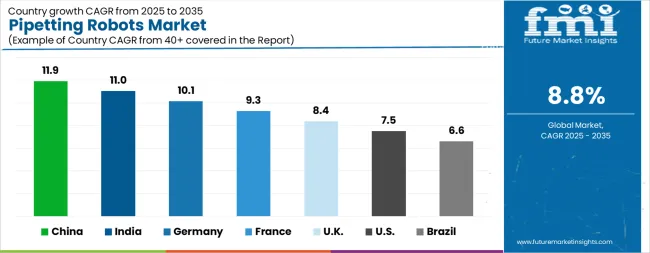
| Country | CAGR |
|---|---|
| China | 11.9% |
| India | 11.0% |
| Germany | 10.1% |
| France | 9.3% |
| UK | 8.4% |
| USA | 7.5% |
| Brazil | 6.6% |
The Pipetting Robots Market is expected to register a CAGR of 8.8% during the forecast period, exhibiting varied country level momentum. China leads with the highest CAGR of 11.9%, followed by India at 11.0%. Developed markets such as Germany, France, and the UK continue to expand steadily, while the USA is likely to grow at consistent rates. Brazil posts the lowest CAGR at 6.6%, yet still underscores a broadly positive trajectory for the global Pipetting Robots Market. In 2024, Germany held a dominant revenue in the Western Europe market and is expected to grow with a CAGR of 10.1%. The USA Pipetting Robots Market is estimated to be valued at USD 986.3 million in 2025 and is anticipated to reach a valuation of USD 2.0 billion by 2035. Sales are projected to rise at a CAGR of 7.5% over the forecast period between 2025 and 2035. While Japan and South Korea markets are estimated to be valued at USD 125.6 million and USD 73.8 million respectively in 2025.
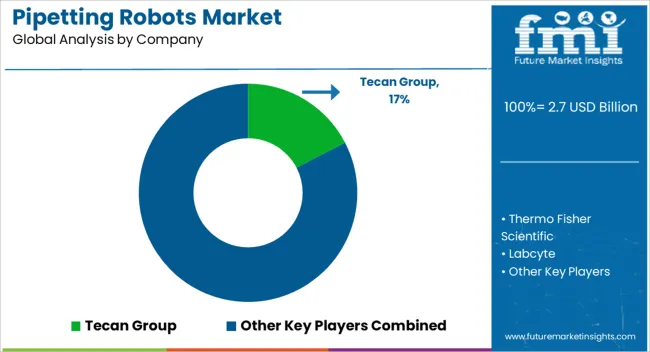
| Item | Value |
|---|---|
| Quantitative Units | USD 2.7 Billion |
| Product Type | Automatic Pipetting Robots and Semiautomatic Pipetting Robots |
| End Use | Healthcare, Chemicals, Pharmaceutical, Biotechnology, and Others |
| Regions Covered | North America, Europe, Asia-Pacific, Latin America, Middle East & Africa |
| Country Covered | United States, Canada, Germany, France, United Kingdom, China, Japan, India, Brazil, South Africa |
| Key Companies Profiled | Tecan Group, Thermo Fisher Scientific, Labcyte, Fluidigm Corporation, BioTek Instruments, Mettler Toledo, Eppendorf AG, Agilent Technologies, Beckman Coulter, Corning, PerkinElmer, Hamilton Company, Gilson, and Sakura Finetek |
The global pipetting robots market is estimated to be valued at USD 2.7 billion in 2025.
The market size for the pipetting robots market is projected to reach USD 6.3 billion by 2035.
The pipetting robots market is expected to grow at a 8.8% CAGR between 2025 and 2035.
The key product types in pipetting robots market are automatic pipetting robots and semiautomatic pipetting robots.
In terms of end use, healthcare segment to command 41.6% share in the pipetting robots market in 2025.






Our Research Products

The "Full Research Suite" delivers actionable market intel, deep dives on markets or technologies, so clients act faster, cut risk, and unlock growth.

The Leaderboard benchmarks and ranks top vendors, classifying them as Established Leaders, Leading Challengers, or Disruptors & Challengers.

Locates where complements amplify value and substitutes erode it, forecasting net impact by horizon

We deliver granular, decision-grade intel: market sizing, 5-year forecasts, pricing, adoption, usage, revenue, and operational KPIs—plus competitor tracking, regulation, and value chains—across 60 countries broadly.

Spot the shifts before they hit your P&L. We track inflection points, adoption curves, pricing moves, and ecosystem plays to show where demand is heading, why it is changing, and what to do next across high-growth markets and disruptive tech

Real-time reads of user behavior. We track shifting priorities, perceptions of today’s and next-gen services, and provider experience, then pace how fast tech moves from trial to adoption, blending buyer, consumer, and channel inputs with social signals (#WhySwitch, #UX).

Partner with our analyst team to build a custom report designed around your business priorities. From analysing market trends to assessing competitors or crafting bespoke datasets, we tailor insights to your needs.
Supplier Intelligence
Discovery & Profiling
Capacity & Footprint
Performance & Risk
Compliance & Governance
Commercial Readiness
Who Supplies Whom
Scorecards & Shortlists
Playbooks & Docs
Category Intelligence
Definition & Scope
Demand & Use Cases
Cost Drivers
Market Structure
Supply Chain Map
Trade & Policy
Operating Norms
Deliverables
Buyer Intelligence
Account Basics
Spend & Scope
Procurement Model
Vendor Requirements
Terms & Policies
Entry Strategy
Pain Points & Triggers
Outputs
Pricing Analysis
Benchmarks
Trends
Should-Cost
Indexation
Landed Cost
Commercial Terms
Deliverables
Brand Analysis
Positioning & Value Prop
Share & Presence
Customer Evidence
Go-to-Market
Digital & Reputation
Compliance & Trust
KPIs & Gaps
Outputs
Full Research Suite comprises of:
Market outlook & trends analysis
Interviews & case studies
Strategic recommendations
Vendor profiles & capabilities analysis
5-year forecasts
8 regions and 60+ country-level data splits
Market segment data splits
12 months of continuous data updates
DELIVERED AS:
PDF EXCEL ONLINE
SLAM Robots Market Size and Share Forecast Outlook 2025 to 2035
Micro Robots Market Analysis - Size, Share, and Forecast Outlook 2025 to 2035
Delta Robots Market
Mobile Robots Market Size and Share Forecast Outlook 2025 to 2035
Pharma Robots Market Size and Share Forecast Outlook 2025 to 2035
Nuclear Robots Market Size and Share Forecast Outlook 2025 to 2035
Kitting Robots Market Size and Share Forecast Outlook 2025 to 2035
Milking Robots Market Size and Share Forecast Outlook 2025 to 2035
Airport Robots Market Size and Share Forecast Outlook 2025 to 2035
Painting Robots Market Size and Share Forecast Outlook 2025 to 2035
Security Robots Market Size and Share Forecast Outlook 2025 to 2035
Military Robots Market Size and Share Forecast Outlook 2025 to 2035
Surgical Robots Market
Logistics Robots Market Size and Share Forecast Outlook 2025 to 2035
Inspection Robots Market Size and Share Forecast Outlook 2025 to 2035
Dispensing Robots Market Size and Share Forecast Outlook 2025 to 2035
Palletizing Robots Market Size and Share Forecast Outlook 2025 to 2035
Therapeutic Robots Market Size and Share Forecast Outlook 2025 to 2035
Educational Robots Market Analysis by Type, Application, and Region Through 2035
AI Assisted Robots Market

Thank you!
You will receive an email from our Business Development Manager. Please be sure to check your SPAM/JUNK folder too.
Chat With
MaRIA